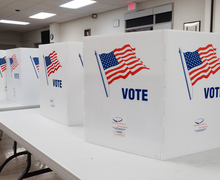Secondhand Juice Jam ticket sales send prices skyrocketing
Moriah Ratner | Staff Photographer
This year, Juice Jam will be held at Skytop field on Sunday Sept. 25.
Tickets to University Union’s Juice Jam Music Festival are hot. Hot enough that some students stood in line for two hours before the tickets went on sale. Hot enough that all 9,500 sold out only four days after being released.
And, maybe most interestingly, hot enough to ignite a secondary market that prices tickets over triple the $20 face value.
These black market ticket sales are mainly coordinated through Facebook. The social networking site is home to student-created groups for each graduating class with several thousand members each. Most days, posts in these groups consist of student organizations self-promoting, researchers looking for some help on a survey, or someone wondering if anyone found their wallet last night.
But once Juice Jam tickets sell out, these groups are inundated with posts from both buyers and sellers who can communicate through the site’s direct messaging feature. For some sellers, Juice Jam is an opportunity to make money off those who tried too late to buy a ticket. Others have just decided for whatever reason, they don’t want to attend the concert anymore. After all, the lineup was announced around 5 p.m. on Friday, Sept. 9 and the tickets went on sale the next day at noon. That is not a lot of time to make a decision, and waiting too long could mean you don’t get a ticket at all.
To avoid this problem, sophomore political science and policy studies double major Mary Storholm was one of the very first people to purchase a ticket. She waited in line for two hours before the box office opened at the Carrier Dome. But while grabbing lunch at Shaw Dining Center afterwards, someone stole the tickets out of her backpack. She said they never turned up after a thorough and frantic search, and the box office couldn’t help either — without any method of deactivating the original tickets, Storholm was out of luck.
Of course, with the crowded secondary market, Storholm could just purchase some replacements from another student selling their tickets, right?
She’d rather not. At least not at the prices that have been offered to her on Facebook.
“I won’t pay those prices out of spite, even if it means missing out on Juice Jam,” Storholm said in a text message. “These people bought an extra ticket hoping to make money off of equally as broke college kids.”
Plenty of others have had similar troubles. Sara Park, a former SU student who has since transferred to Monroe Community College in Rochester, New York, saw the Juice Jam lineup and knew she had to try to come back for the day. Since tickets aren’t available online like they are for UU’s big spring concert, Block Party, she was forced to resort to the secondary market. Her efforts weren’t any more successful than Storholm’s.
“I’ve lost tickets from two different sellers because other people bid way higher than I’m willing to pay,” Park said in a text message. “The highest I’ve seen is $70 for one ticket, $100 for two.”
Alex Van Siclen, an undecided sophomore in the College of Arts and Sciences, has seen prices in the same range. She has been trying to buy two tickets and said that attempts to talk down the prices from sellers don’t do much. They’ll lower them by $5, if anything, she said.
The university has tried to limit scalping by implementing rules for ticket sales. A valid SU I.D. must be presented at the point of sale. To prevent any one person or group from stockpiling tickets, the maximum number of tickets allowed to be sold in one transaction is two.
But that still opens the door for students like Chris Seager to make a quick profit. Seager, a sophomore film major who purchased one ticket for himself and one to sell, said he views making a profit as “mildly important.”
“I just wanted to be able to make an extra few bucks by selling it and maybe even out the cost of my ticket as well so it will basically be a free concert,” he said in a text message.
There are six artists performing at the festival — including some big names like Fetty Wap and Tove Lo — and it costs money to bring them in. UU declined to comment on the matter of the secondary ticket market.
Seager, who sold his ticket Monday for $30, wasn’t worried about finding a buyer. He said there seems to always be people still looking — and he’s right. The Facebook posts keep coming. Juice Jam is still a hot ticket.
Published on September 20, 2016 at 7:48 pm
Contact: jtbloss@syr.edu | @jtbloss





